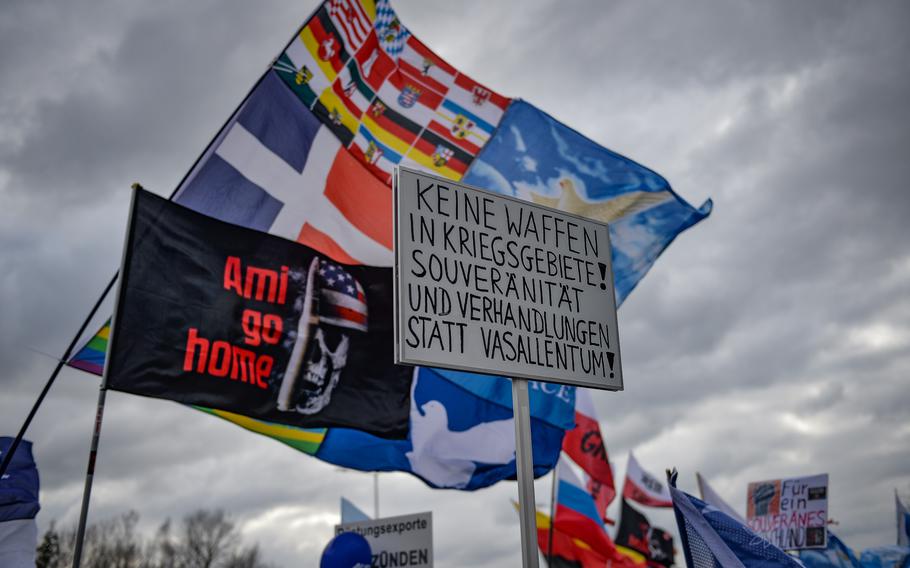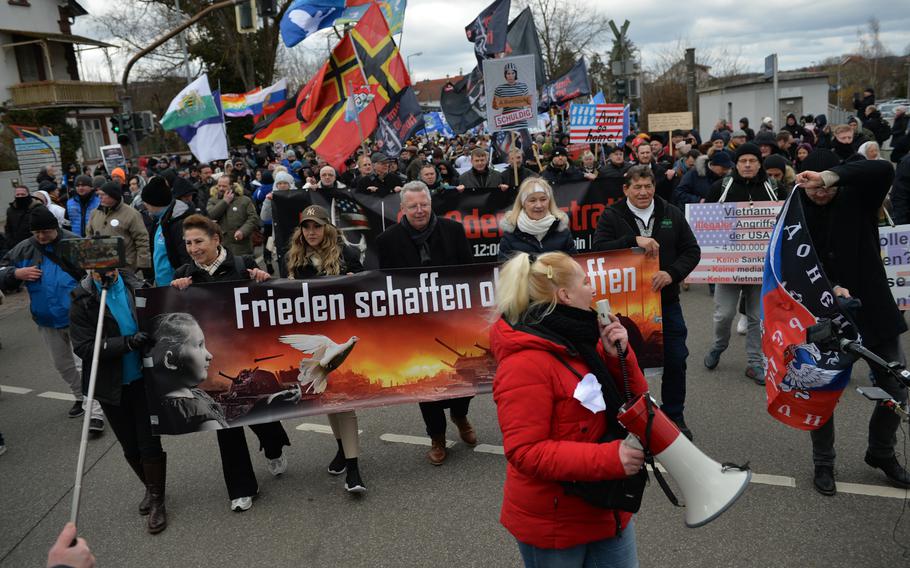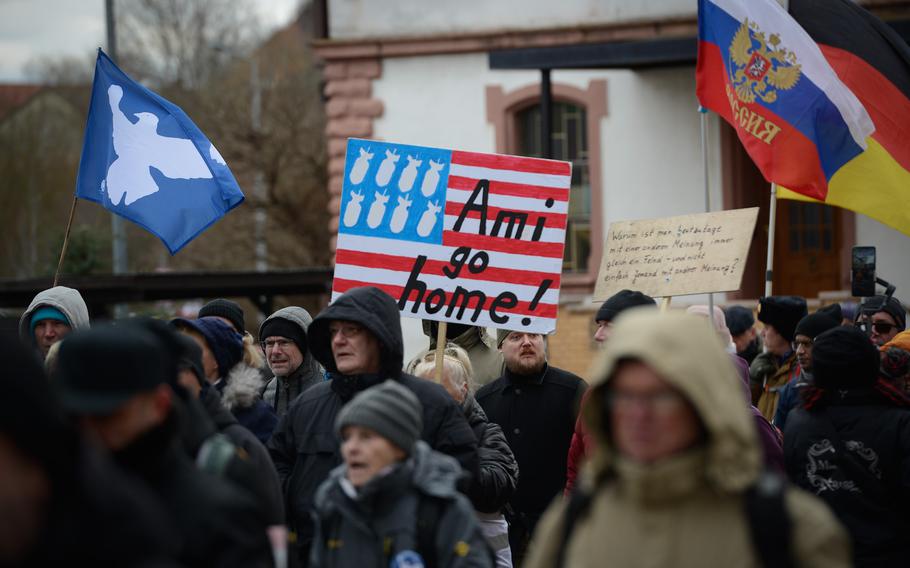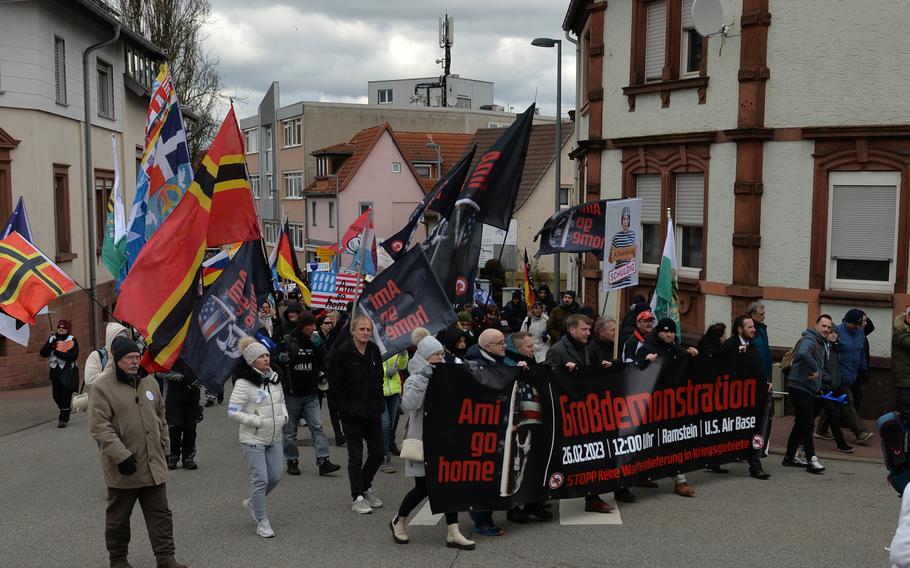
A German-language sign demands an end to weapons deliveries to war zones during an anti-NATO protest near Ramstein Air Base, Germany, on Feb. 26, 2023. The protest attracted a diverse crowd of activists, ranging from pro-Putin supporters to nuclear disarmament advocates. (Alexander Riedel/Stars and Stripes)
RAMSTEIN AIR BASE, Germany — Drumbeats, cowbells and chants of "Ami, go home!" echoed through the streets of the German village of Ramstein-Miesenbach on Sunday, as a large gathering of anti-war protesters took to the streets with Russian flags and handwritten placards.
Organized by a mix of German right-wing politicians and Russian expatriates, the protesters made their way from Ramstein’s small train station toward the main gate of Ramstein Air Base, the largest U.S. Air Force installation in Europe.
Focused on Russia’s war in Ukraine, the protest attracted droves of people who share the organizers' pro-Kremlin views. They also included nuclear disarmament advocates and anti-vaccine activists. German police estimated a crowd of 2,500 people at its peak, according to a statement Sunday.
The protest also was aimed at the U.S. presence in the country. "Ami" is a German abbreviated term for American, often used in a derogatory way.
Roads surrounding Ramstein and the base main gate were temporarily shut down to vehicle traffic to provide the protesters with safe passage.
“We respect citizens’ right to exercise freedom of speech, expression and opinion,” a spokeswoman with the 86th Airflift Wing told Stars and Stripes ahead of the protest.
The march and rally occurred without incident, police said.
The couple at the center of Sunday's protest, Elena Kolbasnikova and Max Schlund, are known for organizing similar protests throughout Germany.
Schlund was identified in a Reuters report in January as Rostislav Teslyuk, a former Russian air force officer. A later Reuters report stated that the couple had donated 500 euros to a Russian rifle division, and that they received tickets from the Berlin arm of a Russian state cultural promotion agency, Rossotrudnichestvo, to travel to Moscow for a conference addressed by Russian President Vladimir Putin.
The couple has expressed their opposition to what they see as Western aggression against Russia.
They chose Ramstein Air Base as the location of their protest because it is a hub for U.S. military operations in Europe, Kolbasnikova said.

Pro-Russian peace protesters march through downtown Ramstein-Miesebach, Germany, on Sunday, Feb. 26, 2023. (Alexander Riedel/Stars and Stripes)
The base also is the site of the recurring Ukraine Defense Contact Group, where international defense leaders have repeatedly discussed military aid for Ukraine.
“I’m very happy with the day and that so many people showed up, and that so many in this country understand what’s really going on,” Kolbasnikova said after the protest. “The media only shows one-sided truth. We’re here to say that we don’t all agree.”
Kolbasnikova, who describes herself as a Ukrainian-born Russian, said that ending weapons deliveries to Ukraine would force negotiations and an eventual peace. When asked about her contributions to the Russian war effort as reported by Reuters, Kolbasnikova declined to comment and walked away.
Most Western security analysts disagree with her views. In 2014, Russia annexed Ukraine’s Crimean Peninsula and supported separatists in the eastern part of country in battles that left 14,000 dead through 2021, according to United Nations figures.
On Feb. 24 last year, Russia launched a full-scale invasion, including a failed attempt to capture Kyiv, Ukraine’s capital. The U.S. and NATO allies have spent billions of dollars arming Ukraine to defend itself against Russia, which has suffered setbacks but still holds large areas of Ukraine.
Moscow’s gains have come at the cost of well over 100,000 soldiers killed, according to allied estimates. Ukraine also has seen high death counts among soldiers and civilians, had millions of its citizens displaced and suffered considerable damage to its cities and infrastructure.

A hand-painted sign calls for U.S. forces to go home during a protest march in downtown Ramstein-Miesebach, Germany, on Feb. 26, 2023. “Ami” is a German abbreviated term for American, often used in a derogatory way. (Alexander Riedel/Stars and Stripes)
The German government has backed Ukraine since Russia’s attack last year, though it has taken criticism from allies for slowly coming around on giving Kyiv offensive weaponry. Germany had been largely dependent on Russian energy purchases until last year’s invasion.
And while Cold War-era West Germany and the unified German state that followed has long been a U.S. ally, some across the political spectrum have long maintained links to Russia.
For example, the far-right Alternative for Germany party was represented at Sunday’s protest. But Gerhard Schroeder, a former German chancellor for the ruling center-left Social Democratic Party, has served on the boards of Russian companies and defended Putin. Schroeder narrowly survived an internal bid last year to oust him from the party he once led.
Ramstein Air Base has been a focus of anti-war activism in Germany for decades. Protesters generally have gathered annually in recent years to demonstrate against U.S. drone operations, among other activities.

Protesters march through downtown Ramstein-Miesebach, Germany, on Feb. 26, 2023. Banners demand "Ami, Go Home!" using an often derogatory short word for Americans. (Alexander Riedel/Stars and Stripes)